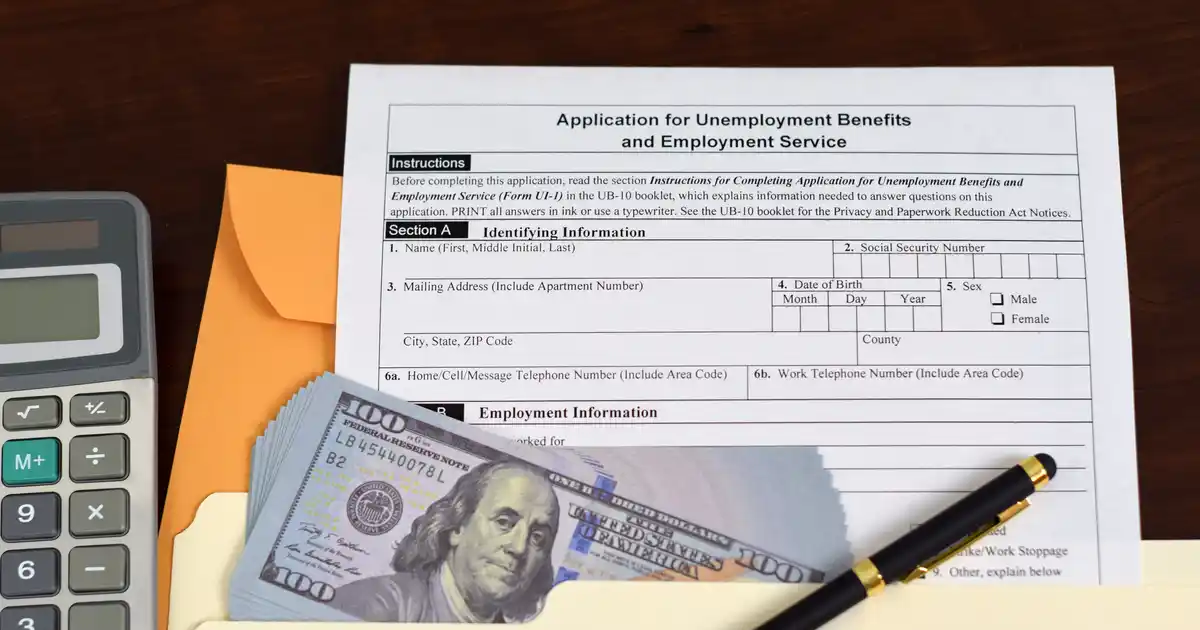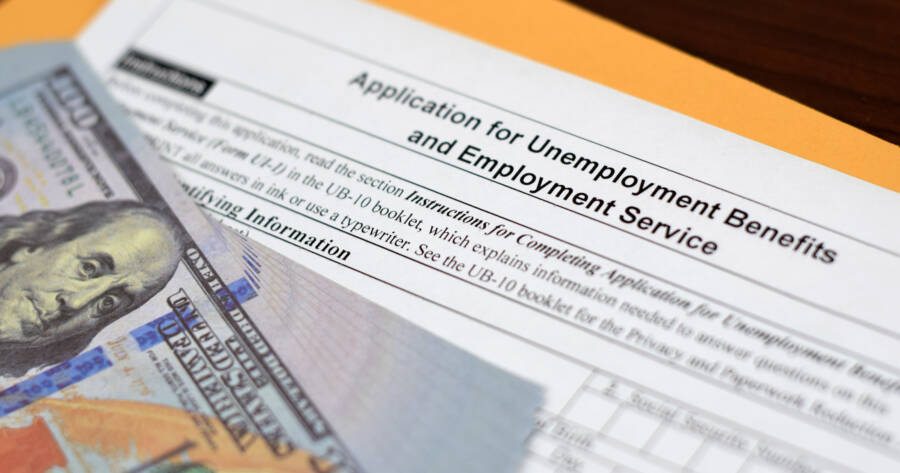The world continues to deal with the effects of the pandemic and the economic uncertainty it created. Every day, the number of Americans dealing with financial hardship increases. Restaurants have closed, newspapers have folded, and companies have liquidated in a bid to tackle the effects of the current predicament. As a result, the U.S. unemployment rate has hovered between 5 and 7% for much of the last 18 months. This has led to Americans flooding unemployment offices all over the country. In light of current events, the government’s unemployment benefits program has taken on an all-new level of importance. Here’s everything you need to know.
What Is Unemployment Compensation?
Unemployment compensation is handed out by the government to American citizens who have recently lost their jobs through no fault of their own. It’s designed to provide temporary monetary assistance to those who have lost active employment through specific reasons. Those reasons can include company restructuring, downsizing, halt of operations, and (more recently) COVID-19 related layoffs.
The program was first drafted into law in 1932 as a response to mass job loss during the Great Depression. It became a federal-state effort in 1935, under President Roosevelt.
Although the mechanics and procedures of unemployment have changed over time, the goal of the program remains the same. It’s there to provide newly unemployed citizens with financial support while they search for new job opportunities. However, there are still a few eligibility requirements to meet before you can qualify for payments.
Who Is Eligible for Unemployment Benefits?
Each U.S. state has its own unemployment agency. That means there are slightly different eligibility rules, which will depend on the state you live in. However, there are a few standard rules of thumb that exist regardless of where you reside.
You Have to Be Unemployed Through No Fault of Your Own
This entails that you must have lost your job due to situations or circumstances out of your control and without cause. This could be in the form of a furlough, cessation of operations, or downsizing.
The unemployment office will determine whether your unemployment was due to external factors. On the other hand, quitting your job or getting fired for intentional wrongdoing will likely disqualify you from receiving unemployment compensation. This is sometimes why companies will give you the option to “resign gracefully” instead of being fired. If you choose to resign, you won’t be eligible for unemployment benefits.
 Shutterstock
ShutterstockYou Must Meet the Work Time and Wages Requirement
To qualify for unemployment benefits, you must meet your state’s requirement for minimum wage earned (or time worked) over a specified time known. This is known as the base period. The base period is usually four of the last five calendar quarters before your unemployment claim was filed.
If you’ve earned a certain amount of wages (or worked a certain amount of hours) during this time, you should qualify for unemployment benefits.
You Must Be Able to Work and Actively Seeking Employment
The unemployment benefits program was designed to only be a temporary aid. That means there’s an expiry date on your unemployment benefits. In short, they won’t last forever. So you need to be actively seeking employment in order to receive any compensation.
Even while receiving benefits, you’ll be required to report to your local unemployment office on a regular basis. You’ll need to present proof that you are fit and able to work, and that you’re actively applying for and seeking out new employment opportunities.
How Does the Unemployment Benefits Program Work?
The unemployment program is a joint federal-state effort. It’s mandated at the federal level and overseen by the Federal Department of Labor. It’s then administered by the state, via their local unemployment offices. In this program, the state acts as agents for the federal government. Each state is given the freedom to set its own guidelines, provided they remain within the federal regulations.
Unemployment benefits are funded by the taxes paid by employees and businesses. Those funds are deposited into the Federal Unemployment Insurance Trust Fund. This fund is used to reimburse states when they submit their total unemployment compensation expenses to the Department of Labor. States can also borrow from federal reserves, if their own reserves are depleted.
 Shutterstock
ShutterstockIs Unemployment Compensation Taxable?
By federal law, all unemployment compensation counts as taxable income. It must be reported on your tax return. However, you can still choose to withhold tax payments on your unemployment checks. However, you run the risk of being hit with a large tax bill when you file your return. It all depends on what your total annual income is, plus any deductions or credits you might be eligible for.
For example, your tax rate might increase if you land a new job (that pays better) before the end of the calendar year. The unemployment payments you received (but didn’t pay taxes on) are now lumped in with the rest of your income. You need to always be aware that unemployment benefits are taxable, so budget accordingly.
Duration of Unemployment Compensation
The duration that you’re eligible to obtain unemployment compensation varies by state. Most U.S. states offer 26 weeks of benefits payment. There are several states which offer less, while the state of Montana actually offers more.
As for the total value of your benefits, the amount received is largely dependent on the cost of living and unemployment rate in your state. Considering the compensation is aimed at replacing lost wages, the exact amount you receive will also depend on your previous salary.
Amount of Unemployment Benefits
Most states tend to pay half of what you were earning during your base period. However, some states also have an upper limit. So, if 50 percent of your previous salary exceeds the state benefits limit, then your benefits will be cut short to stay within state regulations. Additional benefits may be given to employees with dependents, subject to state laws.
It should also be noted that the amount can also be affected by any external income made. Plus, your benefits will cease the moment you gain active employment, regardless of the time remaining on your benefits plan.
 Shutterstock
ShutterstockEffects of COVID-19 on the Unemployment Benefits Program
The U.S. unemployment rate jumped from 4.4 percent to 14.7 percent between March and April of 2020, following the loss of 20 million jobs in the country. To remedy the situation and deal with the record numbers of unemployment claims, Congress passed the Coronavirus Aid, Relief and Economic Security Act (CARES). It contained new policies to support unemployed citizens.
One of the policies is the Emergency Unemployment Compensation program. The policy extends benefits by 13 weeks. This now entitles most Americans to receive unemployment benefits for up to 39 weeks, instead of the standard 26.
How to File for Unemployment
The best time to file for unemployment benefits is within a week after losing your job. You can apply for benefits by contacting the Department of Labor’s Unemployment Office in your state.
To verify your eligibility, you will need your social security card, proof of residence, and documentation of your work history for the past 18 months. You’ll also need your own contact details, of course, and that of your former employers. To prevent your claim from being delayed (or denied), ensure you provide accurate and valid information in your application.
Getting Approval
When you apply, most states will put you through a short interview process where your documentation is reviewed. Next up is a verification process, where the unemployment office reaches out to your former employer to confirm the information they’ve received from you. This process can take anywhere from a few weeks to a month.
Once your application has been approved, most states require a seven-day waiting period before payment of benefits can begin. Once the benefits begin, you’ll be required to report to the unemployment office on a weekly basis. You will have to reaffirm that you’re fit for work and actively searching for employment opportunities before your weekly benefits are paid. If you’re not actually fit for work (due to an injury or health concern), you should be seeking short- or long-term disability benefits — not unemployment.
The Bottom Line
The importance of unemployment benefits couldn’t be higher, given the current economic situation in the United States. The pandemic has created a record number of unemployment claims in the last year and a half. For many workers who suddenly found themselves without a job, this program was a last resort to keep their finances afloat through the pandemic. Thankfully, the program continues to serve the same purpose as when it was established over 70 years ago — to help cushion against the struggles of unemployment for hard-working Americans.








